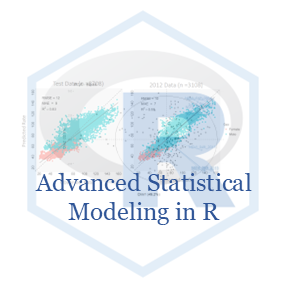Advanced Statistical Modeling in R
Advanced statistical modeling techniques, such as non-linear regression, generalized linear models, and multilevel models, aim to capture more complex relationships between variables than simple linear regression.
The selection of a model depends on several factors. Firstly, the type of data that is being analyzed is essential. For example, if the data has a non-linear relationship between the variables, polynomial regression may be a better option than linear regression.
Secondly, the objectives of the analysis are important. For instance, stepwise regression may be helpful if the aim is to identify the most significant predictors of an outcome variable. It is also essential to consider the strengths and limitations of each model. Ridge regression is functional when multicollinearity exists among the predictor variables. Still, it may need to improve in non-linear solid relationships between the variables.
Trying multiple models and comparing their performance is often beneficial in determining the best model for a given dataset. Techniques like cross-validation can assess the predictive power of each model and select the best one for the task at hand.
This section will delve into the details of advanced modeling frequently used in various statistical analyses. We will explore these models’ intricacies, assumptions, and applications in different settings. By the end of this section, you will better understand how these models work and when to use them to draw meaningful insights from data.
Bayesian statistics, time series analysis, and machine learning will covered in separate sections. These topics are essential for advanced statistical modeling and require a more in-depth discussion.
Further Reading
Here are some references related to advanced statistical modeling in R:
- “Applied Regression Modeling” by Iain Pardoe
- This book provides a comprehensive guide to regression modeling, including both basic and advanced techniques, with practical examples in R.
- “Bayesian Data Analysis” by Andrew Gelman, John B. Carlin, Hal S. Stern, David B. Dunson, Aki Vehtari, and Donald B. Rubin
- This is a classic text on Bayesian methods, covering theory and applications with practical examples in R.
- “Advanced R” by Hadley Wickham
- Although not exclusively about statistical modeling, this book covers advanced programming techniques in R that are essential for building complex models.
- “Statistical Rethinking: A Bayesian Course with Examples in R and Stan” by Richard McElreath
- This book takes a Bayesian approach to statistical modeling, providing practical examples and code in R and Stan.
- “Mixed Effects Models and Extensions in Ecology with R” by Alain Zuur, Elena N. Ieno, Neil J. Walker, Anatoly A. Saveliev, and Graham M. Smith
- This book focuses on mixed-effects models and their applications in ecological research, with extensive R code examples.
- “Extending the Linear Model with R: Generalized Linear, Mixed Effects and Nonparametric Regression Models” by Julian J. Faraway
- This book covers a range of advanced modeling techniques, including generalized linear models, mixed effects models, and nonparametric regression, all with examples in R.
- “Advanced Data Analysis with R” by Kanwal Khipple Mulligan
- This book provides a deep dive into advanced data analysis techniques using R, including predictive modeling and machine learning.
- “Generalized Additive Models: An Introduction with R” by Simon N. Wood
- This book focuses on generalized additive models (GAMs), providing both theoretical background and practical examples using R.
These references should offer a solid foundation for advanced statistical modeling in R.

